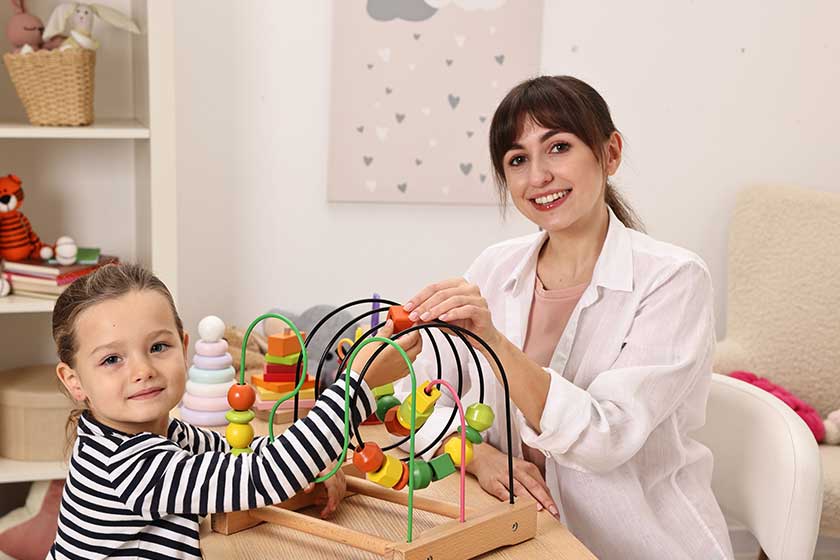
Choosing the Right Autism Learning Center: Why ABA Therapy Matters
When a child is diagnosed with autism, one of the most important decisions parents or caregivers must make is selecting the right Autism Learning Center. With the right resources and trained professionals, an Autism Learning Center can provide the support children need to develop critical social, communication, and life skills. One of the most effective therapies for children with autism is Applied Behavior Analysis (ABA) therapy. In this blog, we’ll explore why ABA therapy is essential for children with autism and how to choose the best Autism Learning Center for your child’s unique needs.
What is ABA Therapy for Autism?
ABA therapy is a highly structured, evidence-based therapy used to help children with autism develop and improve essential skills. It involves breaking down complex tasks into smaller, manageable steps and using positive reinforcement to encourage desired behaviors. ABA therapy is not a one-size-fits-all approach; instead, it is tailored to meet each child’s individual needs. This individualized approach makes ABA therapy one of the most effective interventions for autism, improving communication, social skills, self-regulation, and more.
At an Autism Learning Center, BCBAs (Board-Certified Behavior Analysts) design and oversee ABA programs, ensuring that children receive personalized care based on their specific challenges and strengths. The goal of ABA therapy is not only to address problematic behaviors but also to teach children valuable skills that promote independence and a better quality of life.
Why ABA Therapy Matters for Children with Autism
ABA therapy is widely recognized as one of the most effective therapeutic interventions for autism. Here’s why it matters:
- Improves Communication Skills Children with autism often face challenges in communication, which can affect their social interactions and academic performance. ABA therapy uses a variety of techniques to improve both verbal and non-verbal communication. These may include teaching children to use words, signs, or alternative communication devices to express themselves more effectively.
- Enhances Social Skills ABA therapy focuses on teaching children essential social skills like taking turns, making eye contact, and responding to others in conversations. By using ABA therapy, children can develop more positive social interactions with peers, family members, and caregivers, which can improve their overall relationships and help them thrive in various settings.
- Addresses Challenging Behaviors One of the key components of ABA therapy is addressing challenging behaviors such as aggression, self-injury, or noncompliance. By identifying the triggers for these behaviors and teaching alternative, appropriate ways to respond, ABA therapy helps children learn how to manage their emotions and reactions more effectively.
- Promotes Independence ABA therapy helps children develop skills they need to live more independently. This may include self-care skills like dressing, eating, or brushing their teeth. It can also involve academic skills, such as reading, writing, or completing schoolwork, all of which improve a child’s ability to succeed in various environments.
- Encourages Positive Behavior Through Reinforcement Positive reinforcement is at the heart of ABA therapy. Children are rewarded for making progress, whether through verbal praise, tokens, or other incentives. This approach encourages positive behaviors and reinforces the child’s self-esteem, making them more motivated to continue learning.
Choosing the Right Autism Learning Center for ABA Therapy
Selecting the right Autism Learning Center is essential to ensure that your child receives the highest quality of care and support. Here are some factors to consider when choosing the best center for your child:
1. Qualifications and Experience of Therapists
It’s important to choose an Autism Learning Center with highly qualified staff, including BCBAs, Registered Behavior Technicians (RBTs), and other professionals with experience in ABA therapy. BCBAs are responsible for designing and overseeing the treatment plans, while RBTs provide direct implementation. A strong, experienced team is crucial for delivering effective ABA therapy.
2. Individualized Approach to Treatment
Every child with autism has unique strengths and challenges. The Autism Learning Center you choose should offer personalized treatment plans tailored to your child’s specific needs. Look for centers that prioritize individualized assessments and ongoing adjustments to treatment strategies to ensure continuous progress.
3. Comprehensive Services
A good Autism Learning Center will provide a comprehensive range of services to support your child’s overall development. This may include:
- Social skills training
- Speech and language therapy
- Parent training and support
- Life skills development
Ensuring that the center offers these services will help provide a well-rounded, holistic approach to your child’s care.
4. Clear Communication and Regular Progress Updates
Regular communication between parents and therapists is crucial for monitoring progress and making adjustments to treatment plans. Choose an Autism Learning Center that provides clear, transparent communication. You should expect regular progress reports, meetings with therapists, and the ability to ask questions and receive feedback on your child’s development.
5. Positive, Supportive Environment
The environment at the Autism Learning Center plays a significant role in your child’s success. Look for a center with a positive, supportive atmosphere that fosters trust and collaboration. The center should be a place where your child feels safe, valued, and supported in their learning journey.
6. Location and Accessibility
Consider the location of the Autism Learning Center. Ideally, it should be easily accessible for your family. Accessibility also extends to scheduling flexibility. Look for a center that offers convenient hours or provides options for virtual therapy if necessary.
7. Reviews and Reputation
Research the Autism Learning Center’s reputation within the community. Read reviews from other families, ask for testimonials, and see if the center has a proven track record of success. Word-of-mouth recommendations can also help guide your decision.
How ABA Therapy Can Benefit Your Child’s Future
ABA therapy can significantly impact your child’s long-term success. By learning valuable life skills, improving social interactions, and developing communication abilities, children can thrive in school, at home, and in their communities. A successful partnership with the right Autism Learning Center can help your child reach their fullest potential and achieve greater independence as they grow older.
Conclusion
Choosing the right Autism Learning Center and committing to ABA therapy for autism is one of the most important decisions you can make for your child’s future. ABA therapy is an evidence-based, effective treatment that can address a wide range of challenges children with autism face. When combined with a compassionate, experienced, and personalized approach from an Autism Learning Center, ABA therapy can truly make a difference in your child’s development and well-being.
At Prism Learning Center, we are dedicated to providing high-quality ABA therapy to children with autism. Our experienced team of BCBAs and other professionals work closely with families to create individualized treatment plans that foster growth, independence, and success. Contact us today to learn more about how our ABA therapy services can help your child achieve their fullest potential.
